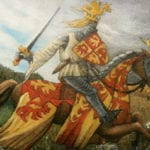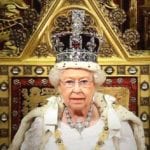 Misconceptions
Misconceptions  Misconceptions
Misconceptions  History
History 10 Amazing Roman Epitaphs
 Weird Stuff
Weird Stuff 10 Niche Subcultures That Are More Popular Than You Might Think
 Mysteries
Mysteries 10 Tragic Disappearances and Deaths in Joshua Tree National Park
 History
History 10 Ways Childhood Really Sucked in the Old West
 Music
Music 10 Name Origins of Famous Bands from the 1990s
 Religion
Religion 10 Biggest Turnarounds by the Catholic Church
 Weird Stuff
Weird Stuff 10 Unbelievable Times Laws Had Unintended Consequences
 Humans
Humans Ten Historic Women Who Deserve Way More Credit Than They Got
 Movies and TV
Movies and TV 10 Films That Spawned Major Lawsuits
 Misconceptions
Misconceptions 10 Phony Myths and Urban Legends That Just Won’t Die
 History
History 10 Amazing Roman Epitaphs
 Weird Stuff
Weird Stuff 10 Niche Subcultures That Are More Popular Than You Might Think
Who's Behind Listverse?

Jamie Frater
Head Editor
Jamie founded Listverse due to an insatiable desire to share fascinating, obscure, and bizarre facts. He has been a guest speaker on numerous national radio and television stations and is a five time published author.
More About Us Mysteries
Mysteries 10 Tragic Disappearances and Deaths in Joshua Tree National Park
 History
History 10 Ways Childhood Really Sucked in the Old West
 Music
Music 10 Name Origins of Famous Bands from the 1990s
 Religion
Religion 10 Biggest Turnarounds by the Catholic Church
 Weird Stuff
Weird Stuff 10 Unbelievable Times Laws Had Unintended Consequences
 Humans
Humans Ten Historic Women Who Deserve Way More Credit Than They Got
 Movies and TV
Movies and TV 10 Films That Spawned Major Lawsuits
10 Vital Facts About Britain’s Radical New Opposition Leader
On September 12, 2015, a 66-year-old, unassuming man from north London managed to shake British politics to its core. After starting the race as the rank outsider, Jeremy Corbyn was elected leader of the country’s opposition Labour Party in a landslide. In American terms, it was like seeing Bernie Sanders become the Democrats’ official nominee for 2016. But Corbyn goes beyond Sanders-style socialism. His election could utterly transform UK politics.
10He’s The Most Left-Wing Party Leader In Decades (Perhaps Ever)

Since 1979, British politics has had a couple of very clear rules. Private enterprise is good, nationalization is bad, and getting filthy rich is fine so long as you pay your taxes. This orthodoxy has underpinned both Conservative and Labour thinking for nearly 40 years. Jeremy Corbyn has just kicked that orthodoxy out the nearest window.
The new Labour leader wants to vastly expand the welfare state, nationalize rail and energy companies, withdraw from NATO, pressure the Bank of England to print more money, raise taxes, and promote immigration. On just about every single issue he’s been described as hard-left.
As recently as June, these policies were considered anathema to the Labour Party. When Ed Miliband lost the election in May, it was widely blamed on his left-of-center policies. Next to Corbyn, Miliband looks about as left-wing as General Franco. Even famous left-wing British leaders Clement Attlee, Michael Foot, and Labour Party founder Keir Hardie were arguably to the right of Corbyn. That he’s managed to become the official leader of Her Majesty’s Opposition despite this shows just how wildly UK politics is shifting.
9He’s Been Called Completely Unelectable

It’s often said that voters choose leaders based on who they’d most like to share a beer with. This is potentially bad news for Labour under Corbyn. Their new leader is a teetotal vegetarian who rides his bike to work, has never owned a car, and spends his time hanging around picket lines and protests. If you asked the average Brit to come up with a cruel caricature of a socialist Londoner, you’d get an accurate picture of Corbyn.
Combined with his socialist policies, Corbyn’s personality has many convinced he’s completely unelectable. The Guardian came up with a handy list to explain why, ranging from his lack of leadership experience to his inability to handle the media. But the crux of the argument is that he’s simply too extreme in every conceivable sense for the fabled voters of Middle England. Prominent left-wing columnists have begun predicting Labour’s wipeout at the next election in 2020. Many are convinced that with Corbyn in charge, the party is now doomed to lose even in 2025.
8Nonetheless, He Won The Largest Mandate In UK History

There’s an odd aspect to Corbyn’s rise. Despite being called completely unelectable, he currently has the largest mandate in the history of the Labour Party, perhaps in British history. In his recent leadership race against three opponents, Corbyn secured nearly 60 percent of the vote. His nearest rival, Andy Burnham, barely scraped 19.
This is doubly important because of the Labour Party’s method of electing leaders. Under guidelines introduced by Ed Miliband, anyone who pays a £3 registration fee (about $4.60) and takes a pledge to support the party can vote. Party members (who pay a recurring fee) can also vote, as can trade union-affiliated members. In all three camps, Corbyn swept the boards. Instrumental to this was his campaign’s effectiveness at getting supporters to cough up the £3. Hundreds of thousands registered simply to support Corbyn, with 15,000 of them becoming full members in the 24 hours after his election. In short, the unelectable Corbyn electrified the electorate.
One theory says polls indicate the British public is more in tune with his radical policies than you might expect them to be, particularly regarding nationalization. Another says Corbyn was the only candidate to challenge the narrative that the previous Labour government was responsible for the Great Recession. After five years of Miliband refusing to defend his party’s record, Labour-leaning voters may have found this a breath of fresh air.
7His Election Was A Complete Accident

When the Labour leadership contest began, Corbyn was more than just the rank outsider. While his campaign received 100:1 odds to win, they should have been even worse. Corbyn wasn’t meant to be on the ballot paper at all.
After Ed Miliband stepped down in May, the leadership contest was supposed to have been a straight choice between the centrist Yvette Cooper and left-of-center Andy Burnham. Corbyn didn’t even want to enter. He was only persuaded to because of the dearth of truly left-wing voices in the debate. Even then, he nearly fell at the first hurdle. Labour Party rules state candidates need the support of 35 MPs to enter a leadership race. Corbyn had at most 20. He only secured all 35 MPs at the last minute. We mean that literally. The window to announce a candidacy expired at 12:00 PM on June 15. Corbyn got his last MP at 11:59 AM.
Even crazier, most of those 35 MPs didn’t even want Corbyn to win. They gave him their support to “encourage debate.” When he became the front-runner, most of them deserted him. Since his election, they’ve publicly called themselves “morons” for supporting him.
6His Own Party Hates Him

Corbyn has been a member of the parliamentary Labour Party since 1983. In those 32 years, he’s voted against his colleagues 500 times. As a result, his fellow MPs dislike him intensely.
While the Labour grassroots can’t get enough of their new leader, the parliamentary party can’t wait to get rid of him. In the run-up to his election, when it became clear he was going to win, his fellow MPs hinted to the press they’d oust him in a coup the moment he took office. When he finally was elected, party grandees resigned en masse. One of the first to go was the shadow health minister Jamie Reed, who timed his announcement to deliberately cause Corbyn maximum damage.
Former Labour leaders have also publicly disowned him. Ex–Prime Minister Gordon Brown has issued dire warnings about the party, and Ed Miliband has refused to serve under Corbyn. Tony Blair was even reduced to literally begging voters not to elect him. However, Blair might have his own reasons for seeing Corbyn kept out of office.
5He’s Happy To See His Own Party Leaders Tried For War Crimes

The Iraq War is widely regarded as the most toxic part of Labour’s legacy. Under Tony Blair, the country followed the US into a war many claimed was illegal. While most Labour grandees have since apologized for the invasion, Jeremy Corbyn has gone one step further. He’s declared he’s happy to see Tony Blair stand trial for war crimes.
Although this might sound like posturing, it’s not as impossible as you may think. Unlike in the US, where no one seriously thinks Dick Cheney might one day wind up in court, the British government has commissioned a report into its own failings during the Iraq War. Known as the Chilcot Inquiry, the report won’t recommend anyone for trial, but it is expected to point a devastating finger of blame at the key actors. In the works for six years now (it was launched in summer 2009), the report could well paint Tony Blair in a less than flattering light.
If that happens, Corbyn has indicated he’s happy for the former PM to stand trial. How likely this might really be is anyone’s guess, but it hasn’t exactly endeared Labour’s new leader to his Blairite colleagues.
4His Movement Is All About People Power

Back in 2008, a little-known senator called Barack Obama went from rank outsider to Democratic nominee thanks to the way he engaged grassroots activists. Through a combination of social media savvy and reaching out to the rank and file, he toppled Hillary Clinton and became the front-runner. In 2015, Jeremy Corbyn has taken that approach to its utter extreme.
From the start, the new Labour leader has rejected old media to interact directly with supporters on social networks. When Andrew Marr, probably Britain’s best-known political interviewer, invited him on his show, Corbyn instead chose to connect with the public online from a small mental health rally. This belief in people power goes beyond social media. One of his pledges in the leadership race was to let ordinary party members determine future policies.
More recently, he’s even tried to involve the public in Prime Minister’s Questions (PMQs). A weekly exchange in the House of Commons between the Prime Minister and leader of the Opposition, PMQs is usually a chance to simply trade insults. Corbyn has instead opted to take questions from the public and ask them directly to David Cameron. It’s an unprecedented move for the Labour Party, one that might herald a whole new era of politics.
3His Election Is Part Of A Broader Left-Wing Resurgence

For all Corbyn’s victory has been described as an “upset,” a “revolution,” and a surprise, the truth is the seeds have been there for a very long time. The Washington Post recently identified a book written in 2011 that predicted exactly this sort of left-wing surge in the Labour Party. Others have claimed the roots go back to 2008. However, this is far from just a Labour issue. Left-wing populists have been rising all over Europe.
In May, the Scottish National Party (SNP) took nearly every seat in Scotland while running on a platform far to the left of Labour. In Spain, Podemos has been causing stir with its anti-austerity rhetoric, while far-left Syriza wound up governing Greece. Both parties have since allied themselves with Corbyn, congratulating him on his victory. Syriza in particular seem to see in him a powerful new left-wing ally in their battle against the EU.
Even beyond Europe, the hard left is enjoying a resurgence. Bernie Sanders is currently outpolling Hillary Clinton in Iowa and New Hampshire, running a campaign remarkably similar to Corbyn’s. In this context, Corbyn appears to be simply riding the same wave left-wing populists are riding everywhere.
2He’s Shared A Platform With Some Shady Characters

Aside from his politics, one of the main things Corbyn has come into criticism for is the sort of people he associates with. While most of them are harmless antiwar campaigners and other activists, he’s occasionally shared a platform with some pretty shady people.
For some members of the British electorate, the shadiest of all might well be the IRA. Three weeks after the Irish terror group bombed a Brighton hotel, nearly killing Prime Minister Margaret Thatcher, Corbyn invited Sinn Fein to speak at the House of Commons, along with two convicted Irish terrorists. His political ally and new shadow chancellor John McDonnell has also previously voiced support for the IRA’s actions during the Troubles.
In more recent times, Corbyn’s also associated with some of the Middle East’s dodgiest politicians. He’s previously called Hamas and Hezbollah “friends,” taken tea with anti-Semitic extremist Raed Salah, presented a program on Iran’s propaganda-spouting Press TV, and been accused of giving money to Holocaust denier Paul Eisen (a charge Corbyn refutes). He’s also endorsed Putin’s claims that NATO was responsible for the unfolding Ukrainian crisis.
While nobody believes Corbyn himself is anti-Semitic or pro-terrorism, these revelations haven’t helped his public image. They’ve also left him open to charges of being anti-British, a tag unlikely to play well.
1Labour Have Been Here Before (Or Have They?)

In 1980, the Labour Party elected its most radical left-wing leader in decades. He dismissed the media and focused on the grassroots activists. He drew enormous crowds to hear him speak and inspired a fevered devotion in his supporters. He held positions remarkably similar to Corbyn. His name was Michael Foot, and in 1983 he led the party to its worst defeat in history.
For the Labour Party faithful, the fear is that Corbyn represents Foot Mark II: a hard-left leader who will destroy their vote share and leave them in the wilderness for another 14 years. After Foot’s disastrous defeat, Labour didn’t win another election until 1997. They only managed it then because they moved rightward, completely abandoning their left-wing economic program. Many MPs are terrified this will happen again.
But times change. For plenty of young voters turned off by a succession of slick-sounding PR-managed politicians, Corbyn seems like a breath of fresh air. After over half a decade of austerity (with more to come), his socialist ideas don’t seem so bad at all. It could be that Corbyn has just destroyed the Labour Party in the UK. On the other hand, he might have arrived just in time to drag British socialism kicking and screaming back into the mainstream. With another five years until he fights his first election, only time will tell.








